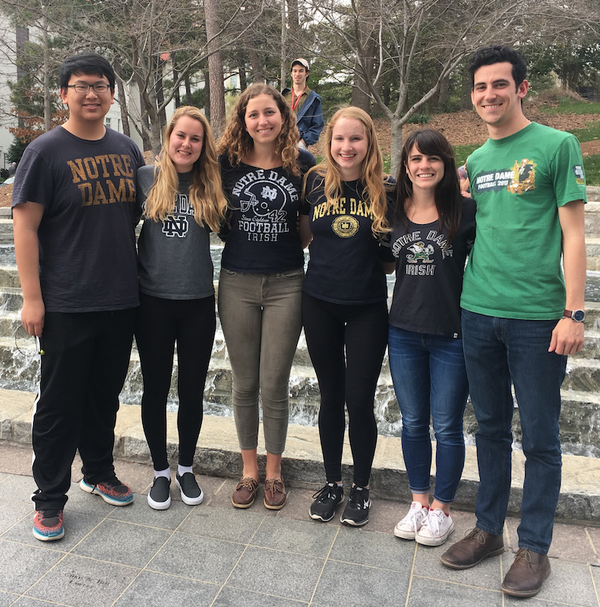After the wake of two devastating civil wars in the 1990’s and 2000's, and the Ebola epidemic in 2014 which left more than 3,600 Liberian children orphans, the Liberian Ministry of Health and Social Welfare (LMHSW) recognized the critical mental health problem in their country, especially among Liberian youth. Imagine you work for a consulting firm that has been asked for a proposal to address this problem. You must develop an interdisciplinary approach built on evidence-based strategies to improve mental health education and reduce stigma associated with mental illness. Most importantly, you only have a week to prepare. Every spring, Emory University hosts a competition where a similar fictional challenge based on real situations is undertaken by undergraduate and graduate students. This year, a team of six University of Notre Dame students, with funding, coaching, and support from the Eck Institute for Global Health, traveled to Atlanta to tackle this challenge as part of the 9th Annual International Emory Global Health Case Competition.
The Emory Global Health Case Competition is a unique opportunity for graduate and undergraduate students from 24 universities, both in the US and international, to come together to promote awareness of, and develop innovative solutions for, 21st Century global health challenges. While the competition uses a similar format as a business school case competition, it is unique in its requirement for students to work in multidisciplinary teams to analyze and present a solution for a current global health issue.

This was the first year the University of Notre Dame participated in the competition at Emory University. The inaugural team was composed of Matthew Angulo ’17, Sociology and Pre-professional Studies, Emma Cooper ’17, Biological Sciences, Gabrielle Davis ’17, Science-Business, Yutong Liu ’19, Biological Sciences, Francesca Mancuso ’17, Science-Business, and Madeleine van Zuylen ’17, Biochemistry and Applied Math. On March 18, while most students were finishing up Spring Break, Emory released this year’s case titled, “A Healthy Future: Addressing Children’s Mental Health Needs in Monrovia, Liberia.” After a week of researching interventions, speaking with subject matter experts, and brainstorming, the team traveled to Emory University in Atlanta to present their proposal.
Judges from organizations such as The Carter Center’s Mental Health Program and Centers for Disease Control and Prevention played the role of the LMHSW. The Notre Dame team outlined a plan designed to raise awareness and reduce the stigma associated with mental health throughout the Monrovian community and empower youth through a skill building curriculum targeting children in schools and community youth organizations. While they did not progress to the finals, the students developed a truly integrative and multi-disciplinary approach, as well as strengthened their abilities to synthesize information, work within the constraints of a limited resource setting, and innovate for issues that affect real people. One of the ND team members, Gabrielle Davis said, “Participating in the Emory International Global Health Case Competition was an incredible opportunity to explore the field of global health beyond the classroom setting. Although I have taken some global health-related coursework at Notre Dame, working with a team on a specific case challenged me to think more about the realities of implementing healthcare development projects on the ground. Throughout the process our team became much more attuned to the challenges of creating a culturally and politically acceptable, financially supported, and sustainable solution whose success could be accurately monitored. It was also exciting to hear about the approaches of groups from other universities that represented a diversity of academic disciplines.”
In order to select students to represent the University of Notre Dame at Emory, the Eck Institute for Global Health hosted an internal competition on Friday, February 3, 2017. Eight teams were charged with developing strategies to strengthen the prevention, early diagnosis, and treatment of malaria in South Sudanese refugee settlements in Uganda. Many students reported that they enjoyed the topic and were eager to learn. One student commented, “malaria prevention is relatively common, but by putting the case in a very specific and unique setting - refugee settlements added a whole other element, and we had to think outside the box to create effective solutions that would work in that particular setting.”
This program has been a phenomenal way to engage undergraduate and graduate students in global health training outside of the traditional classroom. "Participating in international competitions such as the global health case competition gives our students a competitive edge in working on a multidisciplinary team towards solving real world global health challenges and allows them to develop the skill sets necessary for a future in global health careers," stated Director of Global Health Training and Associate Director Katherine Taylor. The Eck Institute for Global Health is currently preparing for next year’s global health case competition at an internal, regional, and international level.
The Eck Institute for Global Health is a university-wide enterprise that recognizes health as a fundamental human right and endeavors to promote research, training, and service to advance health standards for all people, especially people in low and middle-income countries, who are disproportionately impacted by preventable diseases.
Notre Dame Student Team Pictured L to R: Yutong Liu ’19, Biological Sciences; Madeleine van Zuylen ’17, Biochemistry and Applied Math; Gabrielle Davis ’17, Science-Business; Emma Cooper ’17, Biological Sciences; Francesca Mancuso ’17, Science-Business; and, Matthew Angulo ’17, Sociology
Contact Ashley Scott, 574-631-9227, and ascott12@nd.edu